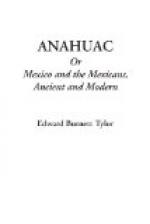On our return from the Real, we spent two days at the house of an English friend at Tisapan, at the edge of the great Pedrigal, or lava-field, which lies south of the capital. It was across this lava-field that a part of the American army marched in ’47, and defeated a division of the Mexican forces encamped at Contrevas. On the same day the American army attacked the Mexicans who held a strongly fortified position at Churubusco, some four miles nearer Mexico, and routed the main army there. They beat them again at Molino del Rey, carried the hill of Chapultepec by storm, and then entered the city without meeting with further resistance; though the Mexicans, after they had formally yielded possession of the city, disgraced themselves by assassinating stray Americans, stabbing them in the streets, and lazoing them from the tops of the low mud houses in the suburbs.
An acquaintance of ours in Mexico met some American soldiers, with a corporal, in the street close to his house, and asked them in. Presently the corporal sent one of the men off into the next street to execute some commission; but half an hour elapsed, and the man not returning, the corporal went out to see what was the matter. He came back presently, and remarked that some of those cursed Mexicans had stabbed the man as he was turning the corner of the street, and left him lying there. “So,” said the corporal, “I may as well finish his brandy and water for him;” he did so accordingly, and the men went home to their quarters.
The American soldiers were, as one may imagine, a rough lot. Only the smaller part of them were born Americans, the rest were emigrants from Europe; to judge by what we heard of them—both in the States and in Mexico—the very refuse of all the scoundrels in the Republic; but they were well officered, and rigid discipline was maintained. So effectually were they kept in order, that the Mexicans confessed that it was a smaller evil to have the enemy’s forces marching through the country, than their own army.
An elaborate account of the American invasion is given in Mayer’s ‘Mexico.’ To those who do not care for details of military operations, there are still points of interest in the history. That ten thousand Americans should have been able to get through the mountain-passes, and to reach the capital at all, is an astonishing thing; and after that, their successes in the valley of Mexico follow as a matter of course. They could never have crossed the mountains but for a combination of circumstances.
The inhabitants generally displayed the most entire indifference; possibly preferring to sell their provisions to the Americans, instead of being robbed of them by their own countrymen. Add to this, that the Mexican officers showed themselves grossly ignorant of the art of war; and that the soldiers, though they do not seem to have been deficient in courage, were badly drilled and insubordinate. One would not




